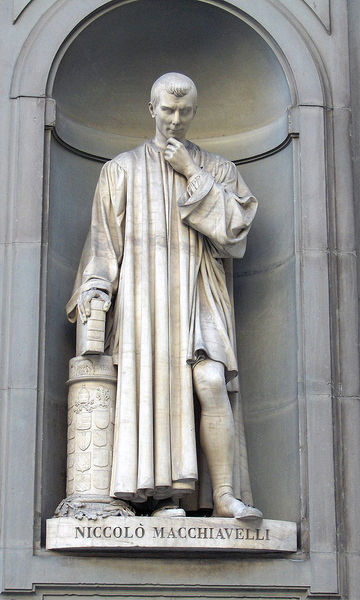Now before the sarcastic responses come out about how this is obvious, after all Machiavelli liked tyrants, blah blah blah.
NO this is actually somewhat surprising. While Machiavelli is somewhat infamous for his discussions of how a person should rule as a monarchy in his book The Prince he was diametrically opposed to tyrants. Even if you ignore his writings from his Discourses on Livy he did not support the uncontrolled use of power by an individual. And many of the advice he gives to monarchs on how to rule seems to be followed by the Party in 1984.
1. A Ruler should be feared but not hated:
This was one of the most important aspects of ruling for Machiavelli was that the citizens should fear the ruler but not hated him. For Machiavelli he was adamant that the worse thing a ruler could be was hated. He should aspire to be feared and loved but must avoid at all costs being hated. So Machiavelli argues that a leader must at least appear to be moral, or act immoral in ways that will not bring hate to him.

And the Party exemplifies this. It fits all 3 parts of Machiavelli's advice. The Part makes itself both feared and loved by its members. (Fearing being arrested for thought crime and loving Big Brother for the protection he provides for them). Even the skeptical Winston, before being broke, expresses at times his love of Big Brother (like during the Hate) and his fear of him is always constant.
And the hatred that the members of the party have is directed towards outsides forces, (Goldstein, the country they're at war with) instead of towards the Party.
2. Another aspect Machiavelli argued is to avoid interfering with the common people as much as possible. If you need to do change he argues do it quickly and get it done with. And both of these aspects are again shown in 1984. The Party avoids interfering with the Proles as much as possible. They let them work but unlike how they treat the members of the Party they do not have the boot constantly at the neck of the Proles.(Or at least they do not seem to) I think this is an important aspect of it because if they were to constantly and obviously oppress the Proles eventually the Proles would get fed up with it and might push back. But by not obviously oppressing them, and keeping them fed and entertained the Proles will be unlikely to ever rebel.
3. Another aspect that reminds me of Machiavelli is part of his encouragement not to be hated. One part of it is it prevents people from being able to plot against you. Because if you try to convince another person to help you rebel and assassinate the leader that person has every reason to betray you. By doing so they will be rewarded and even if they do not they have every chance of not succeeding. And if you are not hated even if you succeed in your assassination attempt you will still be hated by the common people. So only a person who absolutely despises the ruler would agree to plot against the ruler. And this is remarkably similar to how the Party works except in this case the crime would not be plotting to overthrow the Party or assassinate Big Brother but simply not liking the Party.
While some aspects might not quite work with Machiavelli (and in the end he would not approve of the Party in 1984) I suspect that Orwell may have been influenced by Machiavelli.

No comments:
Post a Comment